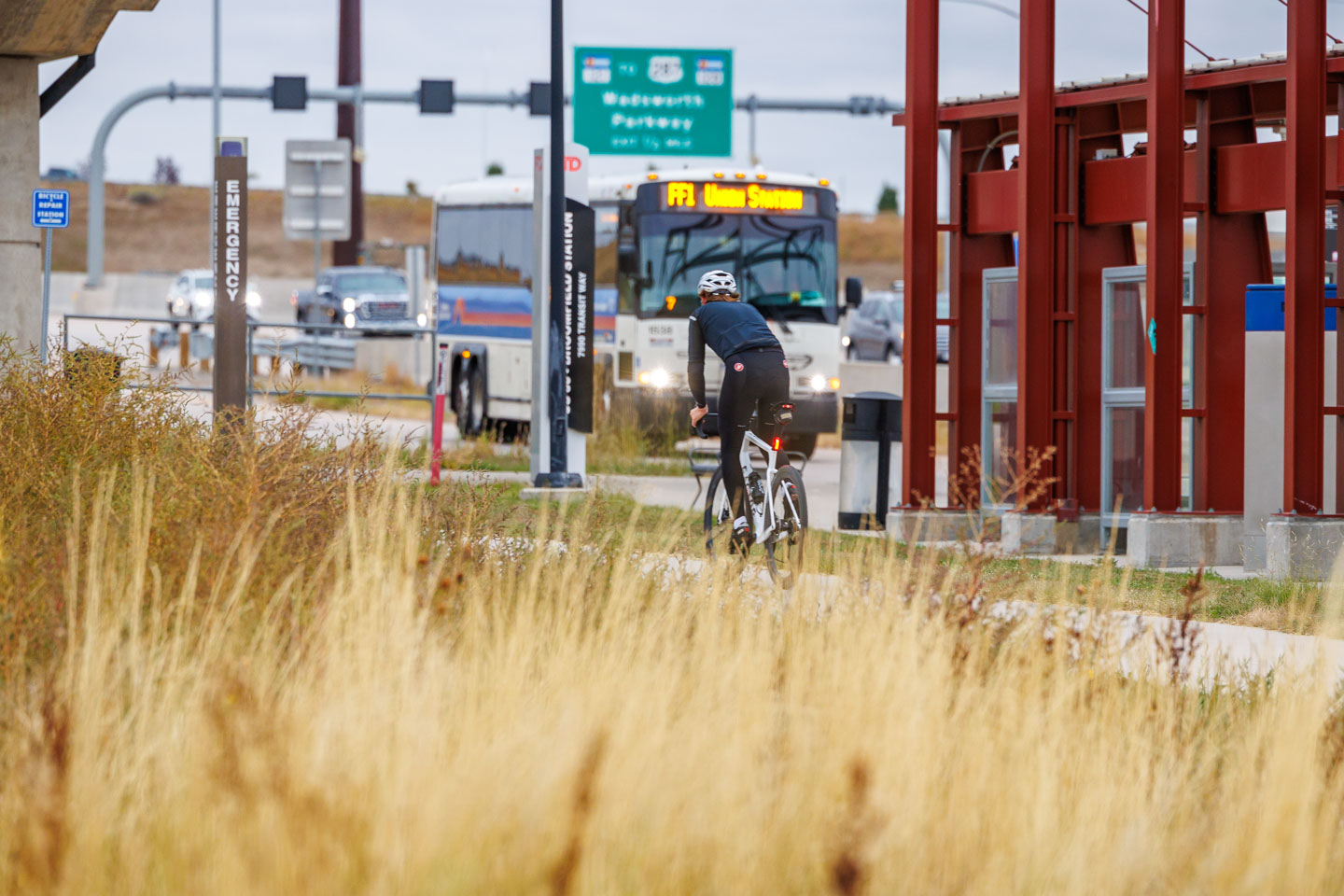
Environmental Programs
Recognizing the Importance of Sustainability
RTD's Sustainability Policy Goal:
"Every effort should be made to incorporate sustainability in the implementation and Program within the authorized schedule and budget and in all other RTD activities, as well. With this goal in mind, a series of recommendations has been incorporated in the attached RTD Sustainability Guidelines to encourage and foster sustainability in all aspects of the FasTracks Program, from planning through design and construction of FasTracks facilities and systems, and beyond the FasTracks program to all capital projects District-wide. This will include developing and adopting best practices for sustainable planning, design, construction, operations, and maintenance activities. The ultimate goal is to instill a culture of sustainability throughout the RTD organization."
Full Programs List
Awards
RTD's Boulder Operating Division was recognized by the "Business Partners for a Clean Environment" as a leader in pollution prevention. The Division was recognized for implementing procedures and measures to reduce waste, increase safety and cut costs.
Bus Emissions Inspections
All buses are tested annually to insure they meet RTD standards that are twice as strict as state standards. Supervisors are trained to make on-street visual evaluations that may result in:
- A bus is immediately removed from service if State Standards are exceeded
- A repair scheduled within 5 days of a reported violation
Clean Fuel
RTD uses premium diesel fuel during high pollution months (October thru March). Premium diesel:
- Provides a low sulfur and aromatic content
- Reduces smoke
- Improves air quality
Electric Free MallRide Shuttles
The Free MallRide buses are fully electric powered by batteries, and the vehicles include regenerative braking that helps to recharge the batteries. These vehicles are referred to as ZEV or zero emission vehicles because there are no emissions, which is even better than hybrid buses that are being replaced.
- Electrical power is provided by battery packs charged by an alternator and by regenerative braking, a process in which the kinetic energy generated by braking is converted to electricity and returned to the power supply line or provided for other on-board uses, such as lights
- Lower noise levels
- Special insulation reduces interior and exterior noise
Engine Replacement and Upgrading
RTD pioneered the use of electronically-controlled engines and transmissions in order to provide:
- More efficient equipment operation
- Reduced exhaust emissions
We are currently replacing older engines with advanced clean-burning, low emission, electronically controlled engines from Detroit Diesel and Cummins. These engines:
- Reduce particulate emissions by 70%
- Allow RTD to meet EPA standards without using particulate traps, which can reduce fuel mileage
Freon Recovery
RTD was the first in the transit industry to use a refrigerant recovery system to capture and recycle Freon for reuse. We were also the first in the transit industry to buy new buses using HFC-134a in our air conditioning systems. Plus, all of our buses previously equipped with Freon R-12 have been converted to HFC-134a or FR-12. Both of these refrigerants are environmentally friendly.
High Altitude Test Lab
A joint program of RTD and the Colorado School of Mines, the High Altitude Test Lab is the only high altitude test lab for heavy-duty engines in the world. The lab uses chassis and engine dynamometers to evaluate new engine technologies and fuels under real conditions.
New Parts Cleaning System
RTD replaced toxic cleaning solvents with a petroleum-based low flammability solvent featuring a filtration system. Filters remove particulates from the new solvent which can then be used for a year resulting in:
- Drastically reduced hazardous waste generation
- Safer employee handling
New Vehicle Paint and Improved Painting Techniques
We use Low Volatile Organic Compound paint (water base) to reduce emissions from paint. Our paint booths use air, not water filtration systems, to eliminate contaminated wastewater, reducing hazardous waste generation.
Recycling
RTD recycles newspapers, office papers, computer paper and aluminum cans in our offices. Special bins have also been set up at major bus stations for commuters to recycle newspapers.
Spill Containment Units
All maintenance service trucks are equipped with Spill Containment Units. This allows drivers to immediately clean up accidental spills such as antifreeze or oil, preventing environmental contamination.
Stormwater Management
Stormwater is water from rain or snowfall that flows across the land and ultimately into rivers, creeks, lakes, and ditches. Other sources of water include over-irrigation, automobile wash water, or any other activity that results in water flowing into the storm drainage system. This water runoff carries debris, trash, sediment, pollutants, etc. from sidewalks, streets, and parking lots through storm drains and eventually into the rivers, creeks, and lakes. Fertilizers, paint, antifreeze, oil, fuel, and other materials may also be carried from urbanized areas to the waterways. These pollutants can add to or create problems in bodies of water.
Stormwater goes directly from the storm drainage system into local lakes, rivers, and streams with no water quality treatment.
The Colorado Department of Public Health and Environment (CDPHE) regulates stormwater runoff. The Regional Transportation District (RTD) was issued a Non-Standard Municipal Separate Storm Sewer System (MS4) permit (permit # COR-070023). This permit covers the Littleton Mineral Park-n-Ride at 7500 S. Platte River Parkway; the Wagon Road Park-n-Ride at 600 W. 120th Avenue; the Airport Blvd. and 40th Avenue Park-n-Ride at 3900 N. Salida St.; and the operating light rail corridors.
To be in compliance with the MS4 permit, RTD must implement programs under Six Minimum Control Measures to control pollutants in storm water. RTD has programs in place to ensure compliance in each of these areas. These six control measures are listed below:
- Public Education and Outreach
- Public Participation/Involvement
- Illicit Discharge Detection and Elimination
- Construction Site Storm Water Runoff Control
- Post-Construction Storm Water Management
- Pollution Prevention/Good Housekeeping for Municipal Operations
For more information about RTD's efforts to minimize pollutants and control stormwater runoff, contact the RTD Environmental Compliance Officer at 303-299-4027 or 303-299-4083.
Xeriscaping
RTD uses low-maintenance, low-water usage landscaping at its Park-n-Rides.